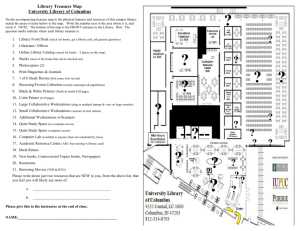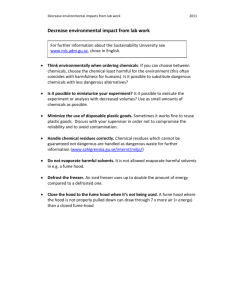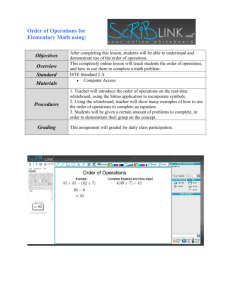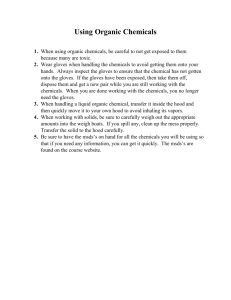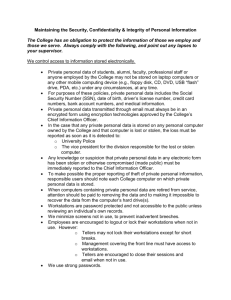Hellmann_Lab_Safety_0.6
advertisement
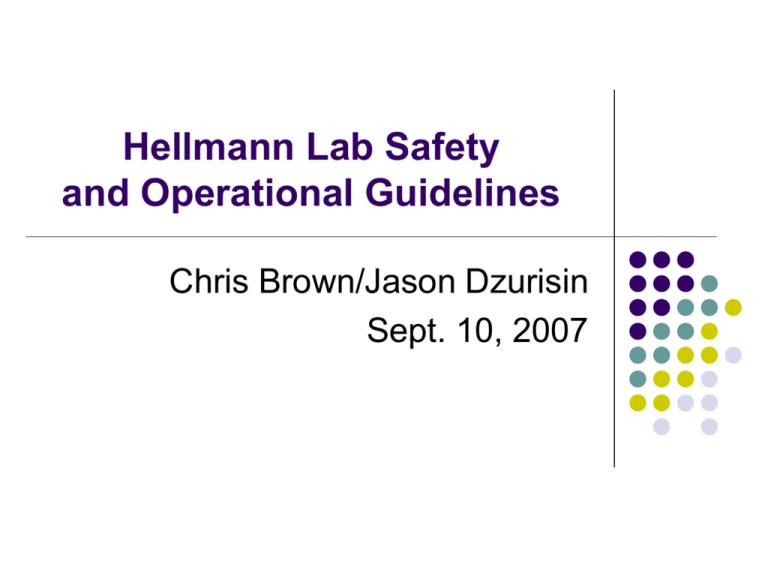
Hellmann Lab Safety and Operational Guidelines Chris Brown/Jason Dzurisin Sept. 10, 2007 Roles and Responsibilities Lab Manager’s Responsibilities: Ensure lab members know and follow chemical hygiene rules. Monitor procurement, use and disposal of chemicals used in the lab. Provide Risk Management and Safety with an annual inventory of hazardous materials. Lab Member Responsibilities: To plan and conduct all operations in accordance with the chemical hygiene procedures. Develop good personal chemical hygiene habits. Obtain information pertinent to equipment and material safety Use personal protective equipment provided. Hellmann Lab Chemical Hazards Flammables Ethanol Isopropanol Chloroform Phenol Isoamyl Alcohol Acid/Base Acids 37% Hydrochloric acid Acetic Acid EDTA Bases Sodium hydroxide pellets Potassium hydroxide Other chemicals Ethidium bromide Mutagenic Suspect carcinogen and teratogen Teratogenic = causes possible genetic birth defects Water Poses electrical hazard Poses physical hazard (slipping, etc.) Safety Considerations Wear gloves at all times when doing bench work Good general practice Prevents absorption of chemicals through skin Prevents contamination of samples Wear lab coat when appropriate Chloroform/Phenol Safety Considerations Spill Response Stairway A, 1st floor Acid, Base, Solvent kits Procedures: 1. 2. 3. 4. Inform Lab Manager Close off and mark spill area Lab Manager will treat spill Contact Risk Management Fire Extinguisher: In lab, near exit Procedures: 1. 2. Pull alarm (outside lab) Use extinguisher 3. Only if fire is ‘manageable’ If larger, evacuate the building Safety Considerations Cuts/Scrapes Eye contamination First Aid kit in lab Next to office Inform Lab Manager Eye wash in lab Tested every month 1. Squeeze handle 2. Keep eyes open 3. Inform Lab Manager Body Contamination Safety showers In bathrooms just outside of lab 1. 2. 3. Tested every month Pull handle…area will not drain Take off contaminated clothing Inform Lab Manager GLP Guidelines Label all handmade solutions with: Contents Initials/Name Date Bare minimum requirements under GLP rules Unknown solutions will have to be discarded MSDS Forms Updated MSDS paper database in file cabinet Better to know what you’re working with than not “Right to know” GLP Guidelines Keep hood as clean/organized as possible Cluttered hood leads to reduced air flow Uncapped or open chemicals can mix dangerously Use certain chemicals in the hood Chloroform/Phenol mixtures Ethidium Bromide BME: beta-mercaptoethanol Operational Guidelines -20° -20° 4° Office Workstations/Whiteboard -80° Fume Hood Storage Dirty Work Microscopy Meetings Mobile workstations Genetics Wet Chemistry Gel Electrophoresis Station Hellmann Lab Layout Food Safe Station 1: Genetics/Wet Chemistry All stations are general use Users are responsible for leaving workspace clean and organized at the end of each workday Red Taped area is RNA Free Zone All tips are autoclaved Station 2: Meetings/Mobile workstations/Food Safe Yellow taped area is food safe. No hazardous materials allowed. Middle stations are free for mobile laptop use or other misc. projects Also used for meetings Station 3: PCR/Electrophoresis/Balance/Waterbath Station is group use Should be left clean at end of use When not active, hardware should be turned off Station 4: Dirty Work/Microscopy Left zone for microscopy only Right zone for dirty projects and materials sorting Should be left organized at the end of each workday Station 5: Office Workstations/Whiteboard Total of 3 computer workstations 1 Apple Powerbook 1 Gateway Desktop 1 IBM Thinkpad Printer Couch Whiteboard Station 5: Continued Office Workstations/Whiteboard All workstations are group use Desktops should be left clean User files should be stored virtually Please collect print jobs promptly; uncollected jobs will be recycled Other considerations When leaving: Clean and organize workspace Double-check all equipment is off Make sure hood shade is down and light is off Wash hands “Check out” with remaining personnel If last to leave, turn off all lights and ensure door is locked
